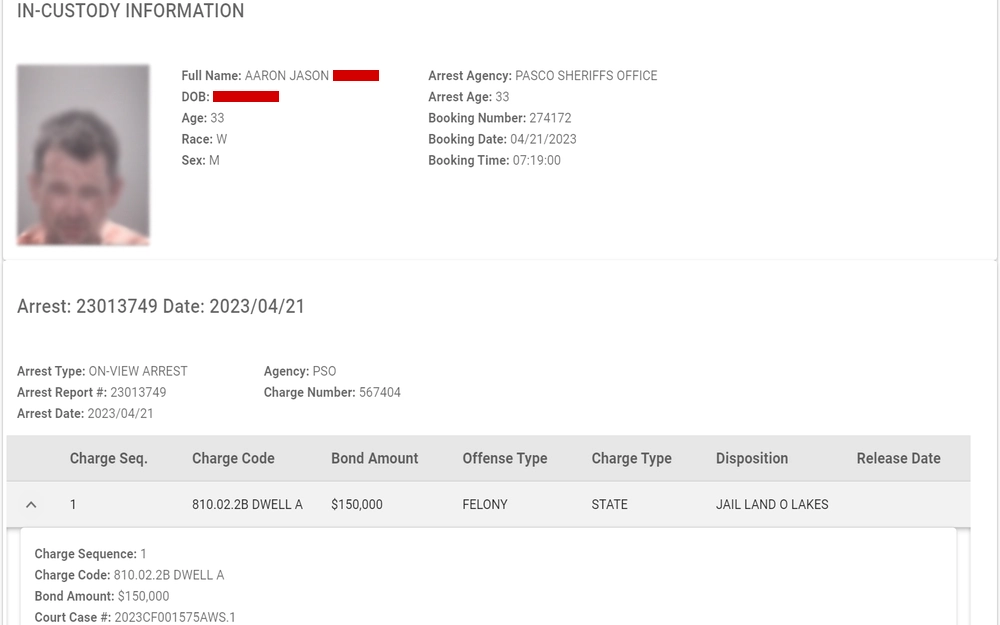Ever wondered how you can access arrest records in Portage County? Well, you’re not alone. Many people find themselves needing this information for various reasons—whether it's for personal safety, background checks, or even just curiosity. In today's world, understanding how public records work is crucial, and we’re here to break it all down for you.
Portage County arrest records are an important part of the public record system. These documents provide insights into arrests made within the county and can be incredibly useful for anyone looking to dig deeper into someone’s past. Whether you’re a concerned citizen, a journalist, or someone who just wants to stay informed, knowing where to find these records is key.
But don’t worry, we’re not just throwing information at you. This guide will walk you through everything you need to know about accessing Portage County arrest records, from the basics to advanced tips. By the end of this article, you’ll feel like a pro at navigating the world of public records. So, let’s dive right in!
Read also:Did Elon Musk Have Jawline Surgery The Truth Behind The Speculation
Understanding Portage County Arrest Records
What Exactly Are Arrest Records?
Arrest records, in simple terms, are official documents that detail the arrest of an individual. In Portage County, these records include essential information such as the name of the arrested person, the date of the arrest, the charges filed, and sometimes even mugshots. They’re maintained by local law enforcement agencies and are part of the broader public record system.
These records aren’t just random documents; they’re crucial for maintaining transparency in the justice system. They allow citizens to stay informed about criminal activities in their area and help ensure accountability from law enforcement agencies. Plus, if you’re ever in a situation where you need to verify someone’s background, these records can be a lifesaver.
Why Are Portage County Arrest Records Important?
Let’s be real—arrest records play a significant role in our daily lives, even if we don’t realize it. For instance, if you’re renting out a property or hiring someone for a job, having access to arrest records can help you make safer decisions. In Portage County, these records are especially important because they reflect the county’s commitment to openness and public safety.
Here’s a quick rundown of why these records matter:
- They promote transparency in law enforcement.
- They assist in background checks for employment or housing.
- They help individuals stay informed about potential risks in their community.
- They provide valuable information for journalists and researchers.
So, whether you’re a concerned parent, a business owner, or just someone who values transparency, understanding arrest records is a big deal.
How to Access Portage County Arrest Records
Step-by-Step Guide to Finding Records
Accessing Portage County arrest records might sound complicated, but it’s actually pretty straightforward. Here’s a step-by-step guide to help you navigate the process:
Read also:Pilot Of Blackhawk Trans The Unsung Heroes Of Modern Aviation
First things first, you’ll want to visit the official website of the Portage County Sheriff’s Office. This is where most of the records are stored digitally. You can usually find a section labeled "Public Records" or "Criminal Records" that will guide you further.
Once you’re on the right page, you’ll need to fill out a request form. This form typically asks for basic details like the name of the individual, the date of the arrest, and any case numbers you might have. Don’t worry if you don’t have all the information—sometimes even partial details can get you what you need.
After submitting your request, you’ll either receive the records electronically or be instructed to pick them up in person. It’s important to note that there might be a small fee associated with obtaining these records, so be prepared for that.
Online vs. In-Person Requests
Now, let’s talk about the two main ways to request arrest records: online and in-person. Both methods have their pros and cons, so it’s good to know what to expect.
For online requests, the process is quick and convenient. You can submit your request anytime, and you’ll often get a response within a few days. However, the downside is that the digital system might not always have the most up-to-date information.
In-person requests, on the other hand, can be more reliable if you need the most current data. Plus, you can often get assistance from a clerk if you’re having trouble finding what you need. The downside here is that it requires time and effort to physically go to the office.
What Information Can You Find in Arrest Records?
Key Details Included in Records
So, what exactly can you expect to find in Portage County arrest records? Well, these documents typically include a wealth of information. Here’s a quick breakdown:
- Name: The full name of the arrested individual.
- Date of Arrest: The exact date the arrest occurred.
- Charges: The specific charges filed against the person.
- Mugshot: Sometimes, these records include a mugshot taken at the time of arrest.
- Court Information: Details about any court appearances or trial dates.
It’s important to note that not all records will have every piece of information listed above. Some might be incomplete or redacted for privacy reasons. But overall, these records are packed with useful data.
Understanding Redactions and Privacy Concerns
While arrest records are public information, there are certain limitations to what can be disclosed. For example, sensitive personal information like Social Security numbers or financial data might be redacted to protect privacy. This is especially true for minors or victims of certain crimes.
It’s also worth mentioning that just because someone has an arrest record doesn’t mean they were convicted of a crime. Arrests and convictions are two different things, and it’s important to keep that in mind when reviewing these records.
Common Misconceptions About Arrest Records
Myth vs. Reality
There are a lot of misconceptions floating around about arrest records, and it’s time to set the record straight. Here are a few common myths and the truth behind them:
- Myth: Arrest records are automatically removed after a certain period.
Reality: Unless specifically expunged, arrest records remain part of the public record indefinitely. - Myth: You can only access records if you know the exact date of the arrest.
Reality: Partial information, like the person’s name, is often enough to locate records. - Myth: Arrest records are always accurate.
Reality: Mistakes can happen, so it’s always a good idea to double-check the information.
By understanding these misconceptions, you’ll be better equipped to navigate the world of arrest records.
Legal Considerations When Using Arrest Records
Know Your Rights and Responsibilities
While arrest records are public information, there are still legal considerations to keep in mind. For example, using these records for discriminatory purposes is against the law. Additionally, if you’re using arrest records for employment decisions, you need to comply with the Fair Credit Reporting Act (FCRA).
It’s also important to remember that arrest records don’t always tell the whole story. Just because someone was arrested doesn’t mean they were guilty of a crime. Always approach these records with a balanced perspective and avoid jumping to conclusions.
How to Interpret Arrest Records
Breaking Down the Jargon
Arrest records can sometimes feel like they’re written in a foreign language, especially if you’re not familiar with legal terminology. Here’s a quick guide to help you decode some of the common terms you might encounter:
- Booking: The process of officially recording an arrest.
- Bail: The amount of money required to release someone from jail pending trial.
- Indictment: A formal accusation of a crime issued by a grand jury.
- Expungement: The process of having a record sealed or erased.
By understanding these terms, you’ll be able to interpret arrest records more effectively and make informed decisions based on the information provided.
Tips for Conducting Background Checks
Best Practices for Using Arrest Records
If you’re planning to use Portage County arrest records for a background check, here are a few tips to keep in mind:
- Always verify the information with multiple sources if possible.
- Be mindful of privacy laws and ethical considerations.
- Don’t make assumptions based solely on arrest records.
- Consider the context of the arrest and any subsequent legal outcomes.
Background checks can be incredibly useful, but they should always be conducted with care and respect for the individual involved.
Resources for Further Information
Where to Go for More Help
If you need more information about Portage County arrest records, there are several resources available to help you:
- Portage County Sheriff’s Office: The go-to source for official records and assistance.
- Local Libraries: Many libraries offer access to public records databases.
- Online Databases: Websites like PACER (Public Access to Court Electronic Records) can provide additional information.
These resources can be invaluable if you’re looking to dig deeper into the world of public records.
Conclusion: Why Knowing About Arrest Records Matters
Understanding Portage County arrest records is more than just knowing how to access them—it’s about empowering yourself with knowledge. Whether you’re conducting a background check, researching for a story, or simply staying informed about your community, these records are a vital tool.
Remember, the key to using arrest records effectively is to approach them with an open mind and a respect for privacy. Always verify the information, consider the context, and use the records responsibly.
So, what are you waiting for? Dive into the world of Portage County arrest records and take control of your information. And don’t forget to share this article with anyone who might find it useful. Together, we can build a safer, more informed community.
Table of Contents:
Understanding Portage County Arrest Records
What Exactly Are Arrest Records?
Why Are Portage County Arrest Records Important?
How to Access Portage County Arrest Records
Step-by-Step Guide to Finding Records
Online vs. In-Person Requests
What Information Can You Find in Arrest Records?
Key Details Included in Records
Understanding Redactions and Privacy Concerns
Common Misconceptions About Arrest Records
Myth vs. Reality
Legal Considerations When Using Arrest Records
Know Your Rights and Responsibilities
How to Interpret Arrest Records
Breaking Down the Jargon
Tips for Conducting Background Checks
Best Practices for Using Arrest Records
Resources for Further Information
Where to Go for More Help


